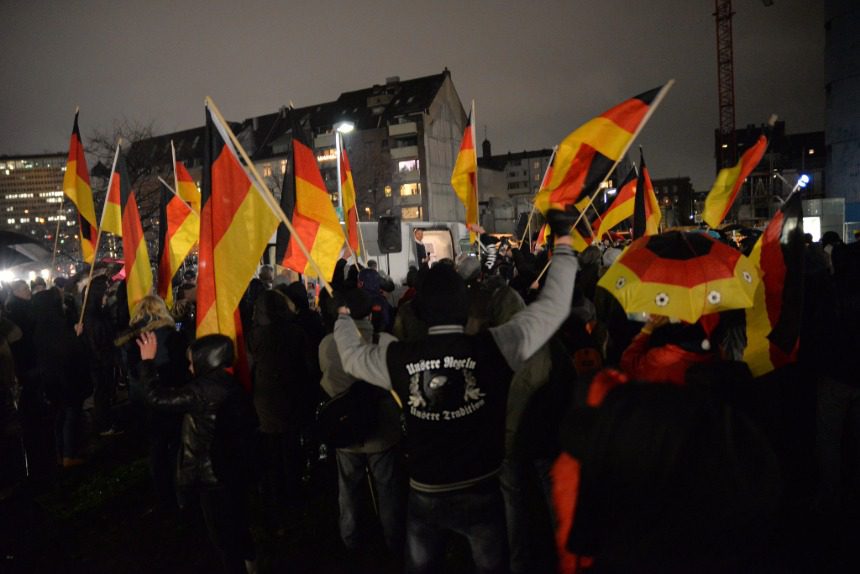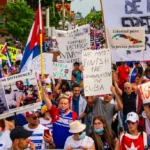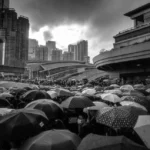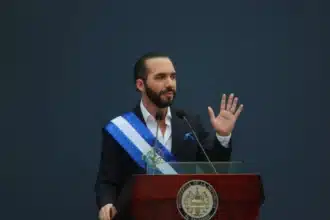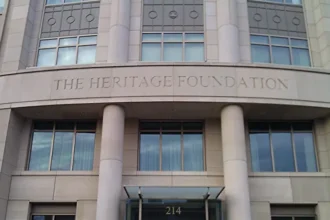Introduction: The Liberal-Illiberal Conundrum
This article explores the democratic complexities encountered by researchers and academic institutions when deciding whether to provide platforms for controversial viewpoints. The focus is on an unexpected turn of events during an academic roundtable in Frankfurt (Oder), East Germany.
- Introduction: The Liberal-Illiberal Conundrum
- The Context of Monday Protests in East Germany
- Academic Engagement and Institutional Responses
- Explore Books Written by Our Contributors
- The Dynamics of Liberal and Illiberal Interactions
- Lessons Learned: Four Patterns of Ambivalence
- Conclusion: Charting a Path Forward
Originally intended to discuss local street protests, the roundtable unexpectedly included the protesters themselves, who were contesting COVID-19 restrictions and later expressing support for Putin amidst the energy crisis and opposition to the German government. This situation illustrates the delicate balance between upholding freedom of speech and establishing boundaries in the presence of rising illiberal movements.
The core issue lies in the inherent tension between liberal principles and the threat posed by illiberal actors. Academic institutions, which should be bastions of free speech and open discourse, face difficult decisions about whom to provide a platform. This incident in Frankfurt (Oder) brought these challenges to the forefront, as the presence of protesters transformed the discussion into a real-time engagement with illiberal elements.
The complex interplay of historical, social, and political factors in East Germany provides a critical context for understanding the liberal-illiberal dynamic.
This scenario underscores the broader challenge faced by democracies worldwide: how to manage and respond to illiberal actors within a liberal framework. The protesters in Frankfurt (Oder) represented a diverse ideological mix, from far-right extremists to conservative skeptics of the democratic state, unified by their distrust of public media and affinity for conspiracy theories. Their participation in the public academic event highlighted the difficulties in maintaining a platform for free expression while also safeguarding the principles of liberal democracy.
The ambivalence of the liberal-illiberal dynamic becomes evident in such interactions, where the commitment to open dialogue can conflict with the need to protect democratic values from illiberal encroachments. This article aims to dissect these tensions, offering insights into how academic institutions and democracies can navigate the complexities of this dynamic.
The Context of Monday Protests in East Germany
On a Monday in October 2022, the city of Frankfurt (Oder) witnessed a significant protest involving over 2,000 participants. As in other parts, especially in East Germany, these individuals marched against rising energy costs and expressed support for Vladimir Putin, highlighting a broader trend of contemporary illiberalism. The protests initially began during the pandemic as a response to COVID-19 restrictions, but they evolved into a broader movement encompassing various ideological perspectives.
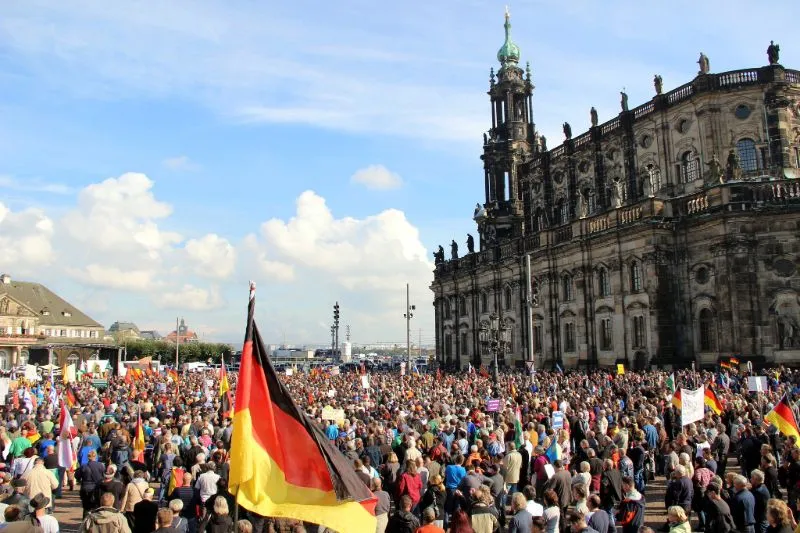
This diverse group included far-right extremists and politically conservative individuals, all sharing a common skepticism towards the democratic state and public media, and a strong inclination towards conspiracy theories.
The historical backdrop of these protests is rooted in the pro-democratic Monday demonstrations of 1989, which were pivotal in the fall of the East German Communist regime.
These demonstrations have since been appropriated by various movements over the years, each with different grievances. In 2004, similar protests emerged in response to labor market reforms, reflecting unresolved socio-economic issues from the post-1989 transformations. These movements consistently attracted more participants in East Germany than in the West, underscoring the persistent regional disparities.
In 2014, the protests took on a more xenophobic tone with the rise of the Patriotic Europeans Against the Islamisation of the West (PEGIDA) movement in Dresden, East Germany. This marked a significant shift, as the demonstrations began explicitly opposing German immigration and asylum policies.
By 2020, the protests had adapted to the pandemic context, rallying against COVID-19 restrictions with slogans like “We are the people,” and bringing together a heterogeneous mix of anti-vaxxers, conspiracy theorists, and far-right activists.
The meaning of “illiberal” implies an opposition to or misuse of political liberal freedom and equality principles.
Frankfurt (Oder), as the first German city encountered by Ukrainian refugees coming through Poland, had established a significant humanitarian aid infrastructure. However, the presence of Russian flags and pro-Putin sentiments among the protesters created a hostile environment for these refugees, complicating the local response to the protests.
This situation illustrates the broader challenge faced by democratic societies in addressing the grievances of illiberal movements while maintaining social cohesion and protecting vulnerable populations. The complex interplay of historical, social, and political factors in East Germany provides a critical context for understanding the liberal-illiberal dynamic.
Academic Engagement and Institutional Responses
Responses to these protests varied depending on one’s position or role: Some faculty members advocated for issuing public statements and taking active measures against the protests, arguing that the university should not remain silent in the face of potential threats to democratic values and vulnerable groups. Others, however, stressed the importance of upholding the principle of freedom of speech, emphasizing that even unpopular or controversial voices deserve a platform within the academic setting.
In other words, representatives of public institutions act differently than individual researchers with academic habits and the potential to create a knowledge gap with non-academics. As politically engaged individuals working at a university, one may have a clear understanding of where to draw a red line between what can be said and what threatens democratic values.
Liberal principles such as freedom of speech and assembly can be exploited by illiberal actors to undermine democratic values.
This divergence in perspectives within the academic community reflects the broader dilemma faced by universities: whether to provide a platform for illiberal voices or to take a stand against them. On one hand, academic freedom is a cornerstone of higher education, ensuring that diverse viewpoints can be expressed and debated. On the other hand, there is a responsibility to protect vulnerable groups, such as Ukrainian refugees, from potential harm or intimidation caused by such expressions. The presence of protesters waving Russian flags and defending Putin added a layer of complexity, making it clear that these issues are not merely theoretical but have real-world implications for the safety and well-being of community members.
Explore Books Written by Our Contributors
Against this background, the roundtable discussion at Viadrina University aimed to explore the nature and motivations behind the local protests but took an unexpected turn when the protesters themselves joined the public event as part of the audience. The ethical challenges posed by this situation are significant. Providing a platform for illiberal voices risks legitimizing their views and potentially normalizing intolerance and conspiracy theories.
However, suppressing these voices could be seen as a violation of the very principles of free speech and open discourse that universities are meant to uphold. The incident at Viadrina University illustrates the balance that institutions must strike between fostering an environment of open academic inquiry and ensuring that such an environment does not become a breeding ground for harmful ideologies.
The Dynamics of Liberal and Illiberal Interactions
The meaning of “illiberal” implies an opposition to or misuse of political liberal freedom and equality principles. The protesters (or some of them) can be considered illiberal because they tend to claim freedom rights for one side only, which in reality means intolerance of the right to dissent, support for Putin as a warlord, or aggressive defamation of members of the governing elite.
The relationship between the liberal and illiberal is, thus, dynamic and actor-centric: Do we protect individual freedom or the freedom of a group? A purely majoritarian approach to freedom would restrict individual freedom. An authoritarian overemphasis on individual rights leads to what is perceived as leftist illiberalism. This dynamic highlights the complexities and contradictions inherent in democratic systems.
Academia faces pressure from those rejecting certain truths and free inquiry.
The concept of “ambivalences of democracy,” as explored by Oliver Hidalgo and myself, provides a framework for understanding these interactions.
Liberal principles such as freedom of speech and assembly are essential to democracy, but they can also be exploited by illiberal actors to further agendas that ultimately undermine democratic values. For instance, protesters in Frankfurt (Oder) invoked their right to free speech to propagate pro-Putin sentiments and conspiracy theories, challenging the democratic norms they claimed to uphold.
Stepan’s theory of Twin Toleration emphasizes the need for a balanced approach where the freedoms of one group do not infringe upon the rights of others. This theory is particularly relevant in examining the limits of democratic tolerance. According to Stepan, democratic systems must tolerate diverse viewpoints up to the point where they threaten the democratic order itself. This balance is often contentious, especially when dealing with movements that explicitly reject liberal-democratic norms.
The practice of “no platforming” exemplifies this tension. Originating as a policy to deny platforms to fascist and racist groups, no platforming has evolved to address a wider range of harmful speech. This practice seeks to prevent the dissemination of intolerant ideologies while preserving the integrity of open discourse. However, it also raises concerns about censorship and the suppression of legitimate debate. Critics argue that no platforming can be used to stifle dissent and marginalize views that, while unpopular, are not necessarily harmful.
The dynamic relationship between liberal and illiberal elements thus poses ongoing challenges for policymakers, educators, and society at large.
Lessons Learned: Four Patterns of Ambivalence
The roundtable event provides valuable insights into how individual scholars and the university as a public institution are challenged by the liberal-illiberal dynamic, highlighting four key patterns of ambivalence: the extent of public space given to illiberal actors, the dangers of self-censorship, the role of public education, and the challenges of academic labeling. These patterns illustrate the intricate balance required to navigate the liberal-illiberal dynamic effectively.
- The first pattern involves the extent of public space that should be afforded to illiberal actors. The roundtable at Viadrina University showed how providing a platform (if only in the audience) for such voices can lead to unexpected and challenging interactions. While academic institutions aim to foster open dialogue, the presence of protesters with illiberal views can disrupt the intended scholarly discourse. This situation raises questions about how much space should be given to perspectives that may undermine democratic values.
- The second pattern concerns the dangers of self-censorship. Academics often face indirect pressures to self-censor to maintain a constructive dialogue with individuals holding opposing views. This self-restraint can facilitate smoother interactions but may also limit the full expression of critical perspectives. For example, during the roundtable, participants may have hesitated to address certain topics or challenge the protesters directly, fearing it could escalate tensions. This cautious approach highlights the delicate balance between fostering open dialogue and maintaining academic integrity.
- The third pattern addresses the role of public education in these interactions. It questions the extent to which universities have a responsibility to educate the broader public. From the perspective of engaged scholarship, universities should be more active in promoting democratic values. The roundtable showed the difficulty of providing educational opportunities for a non-academic public with partly harmful ideologies. The challenge lies in offering informative content without giving undue credibility to views that contradict the fundamental principles of liberal democracy.
- The fourth pattern involves the challenges of academic labeling. Scholars must navigate the fine line between accurately categorizing illiberal elements and avoiding academic concepts that may be perceived as attacks. During the roundtable, the use of terms like “illiberal” or “far-right” could be seen as confrontational, potentially hindering productive dialogue. Academics should therefore reflect on the ways they describe and analyze these movements without alienating the individuals involved, ensuring that their work remains both rigorous and respectful.
Conclusion: Charting a Path Forward
The academic field is increasingly under pressure from those who consider certain truths as lies and threats or who do not accept the idea of freedom of inquiry. This requires sensitive strategies for how to react—as an individual researcher, as a university, and as a private person. The concepts of scholar activism or engaged scholarship legitimize academic activities beyond teaching, researching, or consulting.
The experiences from the roundtable at Viadrina University illustrate the complexities involved in this engagement. The need to balance freedom of speech with the protection of vulnerable groups, the challenges of self-censorship, and the role of public education all highlight the nuanced approach required to navigate these interactions. Academics should continually adapt their strategies to effectively contribute to the preservation and advancement of democratic principles.
In doing so, scholars should ensure that their work remains both rigorous and respectful, while accurately analyzing contemporary illiberal trends in society and politics. Reflecting on the broader implications of the liberal-illiberal dynamic for democratic societies reveals the necessity for ongoing dialogue and adaptive strategies.
Such strategies may include a more sensitive approach towards labels and attempts to engage with certain illiberal ideas, accepting them also as contributions to the public discourse. There is, however, the danger of providing a platform for or legitimizing certain positions that are hostile to the democratic constitutionality of the state or discriminatory.
Adapted from an academic article for a wider audience, under license CC BY 4.0


